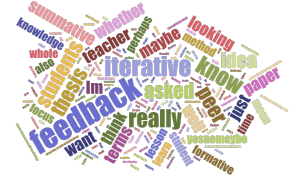 In our doctoral seminar, we’ve been talking a lot about genre and writing strategies. Last night, we experimented with free-writing, or discovery writing, or any other label you’re familiar with. The idea is to write non-stop for a certain period, without backtracking, correcting, planning or pausing.
In our doctoral seminar, we’ve been talking a lot about genre and writing strategies. Last night, we experimented with free-writing, or discovery writing, or any other label you’re familiar with. The idea is to write non-stop for a certain period, without backtracking, correcting, planning or pausing.
My original intention was to rework my writing from that session, and create a new post (it has been AGES, after all), but then I thought it might be interesting to get feedback (see what I did there) on the brain spurt itself. So, sans editing, this is what I wrote last night:
So this morning on the way to the bus I had a thought – I want to look at the concept of iterative feedback. I’ve been thinking only in terms of formative feedback as opposed to summative feeback, but the idea really is iterative feedback. What do I mean by iterative – I mean that feedback has to be happening through the process, from bgnning to end. So there is both formative and summative feedback, but for it to be an optimal learning experience, the student needs to have a constant dialogue with the teacher that really has to be a back and forth, or at least a peer to peer??? So when the teacher begins the lesson… think of my thesis lesson. I asked the students to do the yes/no/maybe paper signal to show me whether or not they felt that they coud wirte a good thesis, then gave them a few ideas/descriptions/definitions, then asked for their papers again. Then we looked at good/bad exmaples, using a checklist, and decided whether or not the examples were really “theses” then I asked them again – definite improvement. Theoretically, the next phase of the iterative feedback idea is the thesis planning sheet, then the outline, and so on. The summative feedback, my comment or even just my grade on their final version, then becomes the culmination rather than just an isolated pass/fail moment.
So now I’m wondering if this is what I want to focus on, or is this just part of a larger whole? I think I want o go bigger, but I’m not entirely sure what that means – am I jut looking at interactions/assumptions/dialogue/communication between teacher and student, or am I instead (or as well) building on Pollock’s idea of feedback and specifically iterative feedback, that incldes peer to peer as well as self-evaluation/metacognitive feedback. The paper yes/no/maybe paper is an example of that meta evaluation –yes, ultimately it shows me whether or not most of them “got” the idea of thesis, but it also asked them to assess their knowledge of their knowledge. This might be a really interesting focus – how to get students to learn to self-assess, not in terms of editing/revision, but in terms of meta-cognition/epistemology. What do I know? How well do I know it? Can I explain it? Can I connect it to other things that I know or need to know? How can I learn more about it if I don’t thiknk I know it?
After all this, I think maybe what I’m really looking it then is how to train students to be thoughtful/mindful students – developing those habits of mind. Very wiggins. I still thknk efeedback is the key to the whole venture…
So for the blog, can I turn this into an entry – perhaps looking not only at the iterative feecdback/metacognitive ideas, but also the did this method of discovery writing work for me?? Shoud I give this method a test run, maybe set aside a time eery day to do exactly this?? It’s perhaps worth a try maybe this could be the coffee shop time Colin and I talked about.
Hi there lady,
I’m no pro, (this is far from any expertise I have) but what this looks like to me is a need to return to the student-tutor ideal. When students actually had one on one time with their tutors for their entire education rather than the class room norm we have today. It makes sense. Perhaps you are searching for a way to do this within the context of a class room with multiple students?
I think, in the end, through the iterative form, you will achieve your goal; to eventually give the student the tools they need to go through this process without the help of an outside eye. I suspect, however, that an outside eye will always be a useful tool, if not a necessary one.
Those are my thoughts. Perhaps not terribly useful, but there it is.